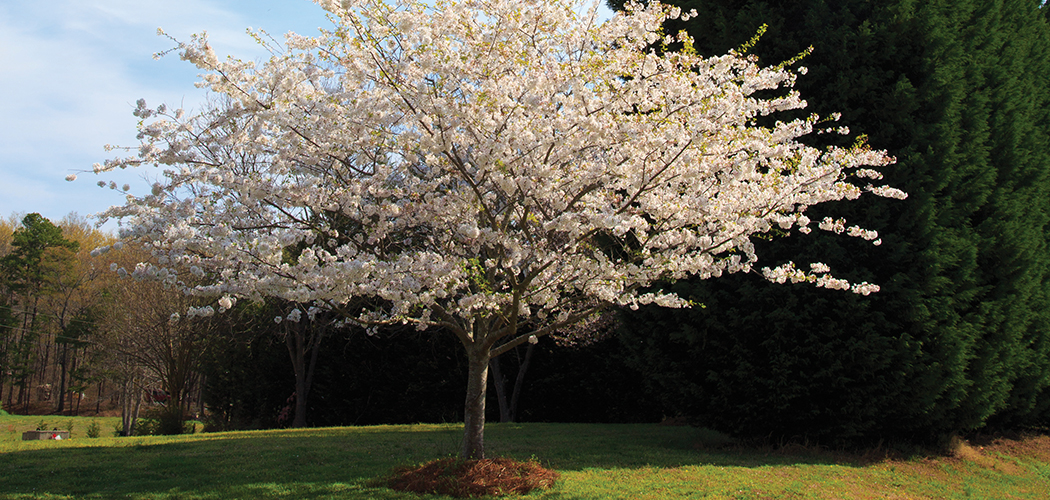[title subtitle=”words: Marla Cantrell”][/title]
Molly slips her winter coat on and jogs across her front yard to check on her Bradford pear tree. It is just after seven o’clock in the morning, on the kind of day that would be lovely if not for the wind that started before daybreak. But the wind is here and it is screaming around the corner of Molly’s house, and it has toppled the plastic chairs that sit on the front porch.
Some of the tree’s leaves are beginning to show, but mostly it’s covered in the blossoms that come first, white and frilled, and they shake in the crippling breeze. Molly’s dark hair whips across her face. With her free hand, she holds her coat closed—there is just her nightgown beneath it—and waits for the blowing to stop. When it does, she touches the tree, making sure every branch is still where it should be.
Molly loves the tree, in part, because she had stolen it. It had happened on a Saturday, at Brook’s Nursery. She’d walked through the rows of flowers without a plan. This was when her father’s death was still so new it seemed impossible. Janie Henry, the owner’s daughter, was working that day. They’d gone to high school together, and she had hugged Molly tight, offered her condolences, and then had said, “But it wasn’t unexpected, was it? I mean, he drank so much.”
Molly had pulled away. She had wiped her eyes and turned on her heel. Janie had called after her, but she had kept on going. Alcohol did not kill her father, but she hadn’t said that, or anything else. Molly had come back later that night, in her dad’s truck with the lift gate. There was a spot where the fence had come down. She’d snuck through, driving the last few yards without headlights. She’d found the row of trees, planted in big pots, and had pulled the truck alongside them. At home, it had taken her two days to dig a hole big enough to plant the Bradford pear.
On the drive to work this morning, her car pitches across the center line, the wind moving it like someone pushing a reluctant actor onto a stage. Molly grips the steering wheel and focuses. At times, it feels as if none of her tires is touching the pavement. As she crosses the bridge over the Arkansas River, she imagines her Nissan rising above the guardrails and landing in the choppy water below. The thought is a jolt, and Molly wipes her brow.
At Vitale’s Cannery and Condiments, she stands in one spot, earplugs in, protective glasses on, a hairnet holding her shoulder-length hair hostage. She watches a steel vat holding more strawberries than one field-hand could pick in a day. Steam rises about the vat. A gas fire flickers below it. This will soon become jam. She likes to think of it after it leaves this place, sitting in jars on kitchen tables. There is always a tablecloth in her imagining, and it is always made from blue gingham.
This place is loud: forklifts, conveyor belts, the rise and fall of hydraulic equipment. At break time, she sits with Leo, who, at forty, is older than Molly by a decade. In the small room that is only slightly less loud than the cannery’s floor, Leo goes to the machine, drops in a quarter, gets her coffee, brings it back. When he sits, his hand rests on her knee, and she lets it stay there. She may be in love with Leo. She may not. It’s too early to tell.
“The wind,” he says, and then frowns.
“If it doesn’t stop, I may lose my Bradford pear.”
“Your daddy’s tree?” Leo asks.
She’d told him the story of the tree just after they met, in one of those confessional moments meant to bind two people together.
“You think I hold on too tight. I know you do,” Molly says. What she is thinking is how she asked Leo to stay the last time he came over, and how he ran his hand through his hair, and how he looked at the door for a beat too long before he said yes.
“Maybe,” he says.
The thing about Bradford pears is that they don’t have enough give to them, not like a weeping willow, for example. This is what Molly thinks on the way home, her back straight, her stomach pulled in. She turns the radio up to mask the sound of the wind. Still, her car tilts on sharp turns. It slips onto the shoulder of Georgia Ridge Road, where autumn’s old leaves skip across the pavement.
At home, she makes chili and cornbread, heating up the cast iron skillet before she pours the batter in. The weather forecast is on TV. More wind, and a chance of frost. Molly eats quickly, gathers up three of her grandmother’s quilts and the rope she keeps in her tool shed. She pulls her sweatshirt’s hood down as low as she can, and still the wind stings her eyes. When she reaches the tree, she wraps the trunk first, tying the Wedding Ring quilt tight with the rope. She wraps the Crazy quilt around the lower branches on the right side, and the Fine Tooth Comb quilt on the left. The top of the tree she can’t reach, and it shudders in the cold night, shaking like the head of a demented person.
The frost that was predicted never shows up, but the wind sings all night long. Molly waits for the sun to rise, and then she goes to the tree and unwraps the quilts. Her breath catches. There, where the trunk branches out, is a split. She feels the air punched out of her. The wound glows silver in the new light, and it is deep.
On the phone, Molly says, “I can’t come in today. I think I have that stomach bug that’s going around.” There’s a pause, and then she says, “Tomorrow? I’ll have to see.”
The next call she makes is to Leo. He listens, and then he says, “It’s a dang tree, Molly. You need to get over it.”
Molly’s house is spare and neat. Still, she picks up a dust cloth and runs it across the TV, and across her dresser in the bedroom. At noon, the wind finally settles, and she goes outside, spreads the Wedding Ring quilt across the new grass, and sits beside her tree.
A few yards away, her neighbor, Caroline Ritter, carries out her trash and dumps it in a barrel. She brings out two more loads before she lights a match and tosses it in. If the wind picks up again, everything Molly has could be gone just like that.
“Hey!” She calls out, and Caroline looks her way. “There’s still a burn ban. You’re not supposed to be setting fires.”
Caroline pulls a pack of cigarettes from the pocket of her red flannel shirt, puts one in her mouth. She walks toward Molly as she lights the thing, her shoulders hunched. She has a hitch in her step, so there’s no rhythm to her walking. When she reaches Molly, she says, “I’m watching it.” She points to her house. “I got the water hose right there.”
Caroline takes a long drag on the cigarette, her pale eyes narrowing. “Can I sit a while?” she asks, and then holds on to Molly’s shoulder as she lowers herself onto the ground.
“What are you doing out here in the middle of the day?” Caroline asks. “Shouldn’t you be at work?”
“I guess,” Molly says, and then she squeezes her eyes shut for just a second. “I think my tree is dying; it split overnight. I called my boyfriend, or anyway this guy I thought was my boyfriend. He told me to suck it up.”
“Men are idiots,” Caroline says. “I had a crepe myrtle I just loved. Planted it on the day my boy, Donovan, was born, thirty-six years ago. The drought got it three years back.”
Caroline holds the cigarette away from her and examines it. “I still miss it.”
“I stole this tree,” Molly says. “Only thing I ever took like that.”
“You must have wanted it something terrible,” Caroline says.
“I’m not sure what I wanted,” Molly says.
Caroline pushes herself up, first on her knees, and then struggles to stand. She stubs out her cigarette, walks back to her house. The fire is sparking higher and she takes the hose and douses it, the smoke thick and black when the water hits the fire. When she comes back, she’s carrying two beers, a tin of pruning tar and a tablespoon. She puts one beer in the pocket of her sweat pants, hands the other one to Molly, and dips the spoon in the tin. She spreads the black goop across the gash in the tree. “Let’s see if we can save this beauty,” she says, and Molly feels so much gratitude she thinks she might faint from the sheer force of it.
When Caroline finishes, she hands Molly the tin. “Keep it,” she says. “Check on the tree every few days. If it needs more, just spread it on. This stuff will keep the bugs out. It’ll keep the diseases out. It might give you another year with the tree.” She pauses. “Maybe two.”
The tree can’t be mended. Molly knows it the way she knew her father was going to die, even when the doctors said it wasn’t so. But she smiles anyway, and then she opens the amber bottle of beer. Caroline uncaps her own bottle, taps it against Molly’s, and the sound is like a bell.
The sun is bright now, warming everything below it, and Molly suddenly remembers being on a river bank with her father, fishing for rainbow trout just as dawn arrived. She might have been eight years old at the time. Maybe nine. He held his hand on hers, showing her how to cast, over and over. When he let her try on her own, she could still feel the weight of his fingers on hers. It kept her steady as the line arched up and over and landed brilliantly in the sparkling water. Anyone watching that day would have thought she was fine on her own. It was an easy mistake to make, since none of them had ever seen her without him.




